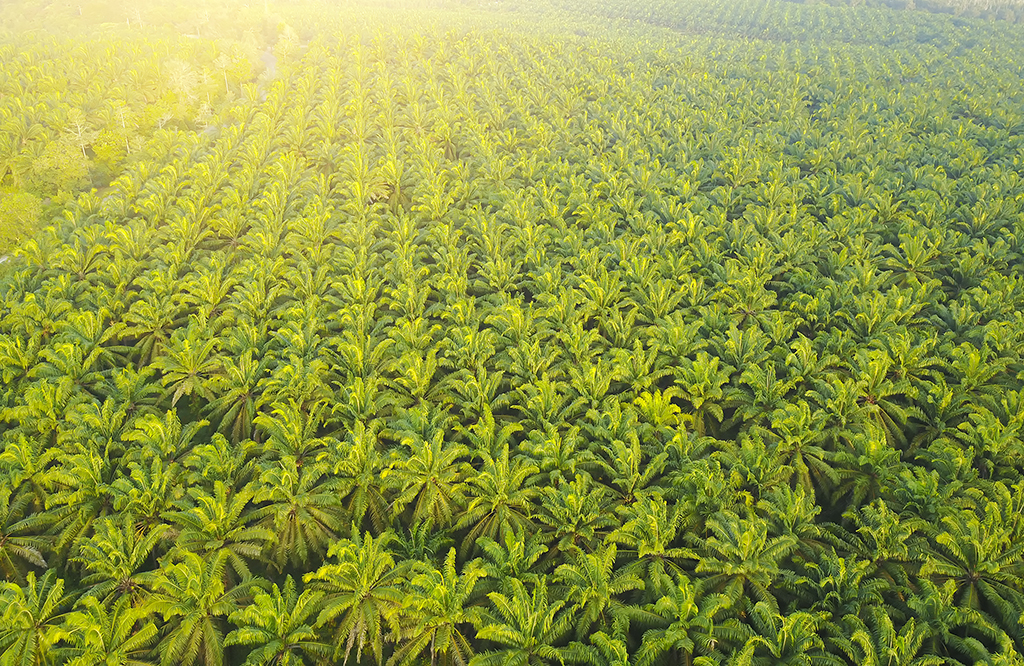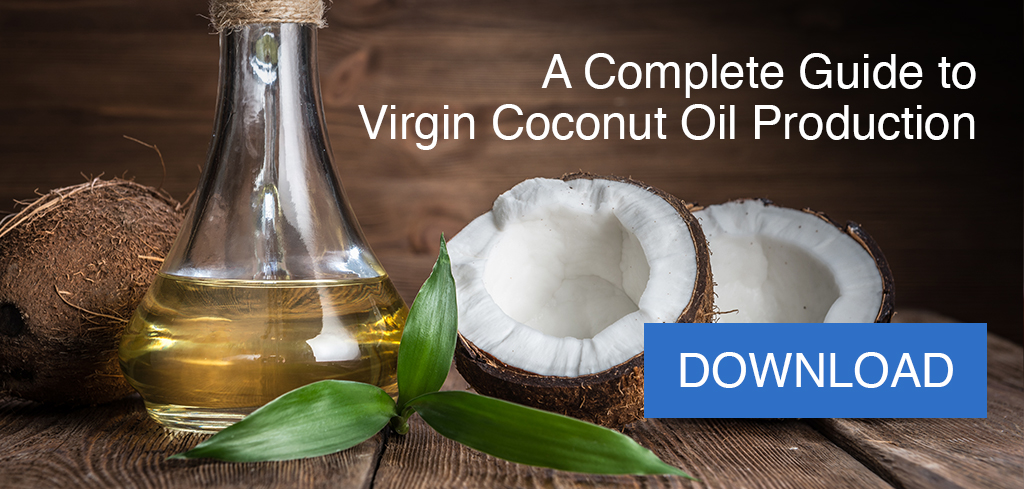
Virgin coconut oil has been called “the healthiest oil in the world” thanks to its unique fatty acid composition and abundance of nutrients. Unlike traditional coconut oil—which is extracted from dried coconut meat, or copra, and then refined, bleached, and deodorized (RBD)—pure virgin oil is pressed directly from fresh coconut kernels, so it retains all the health benefits and flavors of the raw fruit.
While RBD coconut oil has been produced and used for thousands of years in cooking, cosmetics, soaps, and other applications, virgin coconut oil is a relatively new product. Health-conscious consumers are driving demand faster than farmers and processors can supply it, causing prices to surge.
To keep up with this growing demand, processors need to understand how to press the purest coconut oil possible to meet the highest quality standards.
Pre-processing steps
While immature green coconuts are typically harvested for the nutrient-rich liquid inside, mature brown coconuts (at least one year old) are preferred for optimal oil extraction. Preparing coconuts for oil extraction is a labor-intensive process. Mature coconuts drop from coconut palms, which can grow 100 feet tall and produce 100 fruits yearly.
VCO plants receive the coconut whole and use every element of the fruit:
- First, the processor removes the husk, which is used to produce several fibrous materials, such as brushes, door mats, and even twine.
- Next, the coconut is drilled, and the water is drained out. The water is then purified and filtered to produce nutrient rich coconut water.
- After draining the coconut, the shell is removed. It is commonly used in diatomaceous earth and as a source of activated carbon.
- Then, the processor removes the coconut skin—a thin, brown layer between the shell and the coconut meat, which is typically shaved off and pressed separately to produce slightly darker coconut oil sold with copra oil.
- Finally, the processor grinds the pure white coconut meat to produce desiccated coconut for confectionary purposes—alternatively, it can be processed to produce virgin coconut oil.
Fresh coconut meat contains about 50% moisture and 34% oil by weight. Instead of thoroughly drying the meat in smoke, sunlight, or kilns to produce copra, virgin coconut oil production involves the minimal amount of heat exposure needed to dry the meat to its ideal moisture content. Short residence times in indirect hot air dryers or fluidized bed dryers reduce the moisture content to about 3-4% without scorching the meat.
Also read: The Economics of Dehulling Oilseeds
Processing virgin coconut oil
Dried, shredded coconut meat, called desiccated coconut, is fed directly into high-pressure expellers to extract the oil. The lower the moisture content of the material fed into the press, the more efficient the extraction process will be and the higher the yield.
Desiccated coconut contains up to 70% oil by weight—more than any other oilseed. To recover as much of this oil as possible, processors typically press coconut twice, either using multiple presses or running the material through the press again. Unfortunately, double pressing consumes twice the energy and adds equipment redundancies to a mill.
The Anderson Super Duo™ Series Expeller® offers the ideal solution. With a unique dual-press design that crushes coconut twice in a single pass, the Super Duo uses horsepower efficiently to achieve maximum oil recovery without additional energy or equipment. More than 700 Super Duos are currently operating throughout the Philippines and Indonesia, where most of the world’s coconut oil is produced.
The Super Duo also contains a built-in cooling system to prevent oil from overheating in the press, which could cause discoloration. This cold pressing method is key to producing high-quality colorless virgin coconut oil since excessive heat can turn the oil yellow, precluding it from being labeled “virgin.”
Heat treatment and cooking are usually critical to prepare oilseeds for pressing, so skipping these steps makes it challenging to recover virgin-grade oil. Cold pressing demands an expeller with extremely high torque to crush raw coconut harder and release the oil trapped inside. The Super Duo delivers—reducing residual oils to 8% or less in a single pass, compared to other cold presses, which leave up to 14% of oil behind.
Cold pressing doesn’t mean that oil is produced without heat. In fact, expelled oil is usually heated in a vacuum or air dryer after pressing to remove residual moisture, which can cause rancidity. What makes coconut oil “virgin” is the lack of chemical treatment or refining steps used to process traditional oil, which can strip away antioxidants and other essential nutrients. As a result, unrefined virgin coconut oil is packed with the flavors, aromas, and nutrients of fresh coconut.
Also read: Debunking the Debate Between Expeller Pressed Versus Cold Pressed Oils
Virgin coconut oil products
Like copra-derived coconut oil, virgin coconut oil is mainly composed of saturated fatty acids (up to 96%)—making it unique among plant-based oils, which are usually high in unsaturated fats. Saturated fats have a longer shelf life, a creamy butter-like consistency at room temperature, and a higher melting point, which makes virgin oil a great alternative to butter when cooking and baking. On the other hand, the higher smoke point of RBD oil makes it a better fit for frying at higher temperatures.
Unlike copra oil, virgin oil contains more nutrients like vitamin E and bioactive compounds like polyphenols, which give the oil antioxidant properties. Additionally, virgin coconut oil is comprised of up to 67% medium fatty chain acids (MCFA), especially lauric acid, which adds anti-microbial and immunity-boosting characteristics. MFCAs are easily digestible and metabolize quickly instead of building up as fat deposits. All these benefits contribute to virgin coconut oil’s reputation as one of the healthiest oils on earth.
Besides having many edible applications, virgin coconut oil is a common ingredient in hair treatments, skincare products, and cosmetics due to its moisturizing and conditioning properties. Its foam-boosting traits make it helpful in making soaps, detergents, and other cleaners, too. A slew of nutritional properties combined with other functional benefits also make it a popular choice in pharmaceutical and nutraceutical products, where it’s used as a carrier oil in vitamins and other treatments.
As people learn more about the benefits of virgin coconut oil, this market is expected to grow from more than $2 billion in 2020 to nearly $3.7 billion by 2028.
Unlimited processing opportunities
While much of the world’s virgin coconut oil is still produced by small-scale operations in tropical villages using inefficient, manual methods, innovation in this space can set commercial processors apart. By producing premium oil more efficiently using Anderson’s industry-leading equipment, processors can tap into the potential of this popular tropical oil.
The extraction experts at Anderson International have decades of experience pressing coconut in operations of all sizes around the world. By reducing the number of energy-draining steps involved in crushing virgin coconut oil, Anderson can help processors maximize yields and profits.
